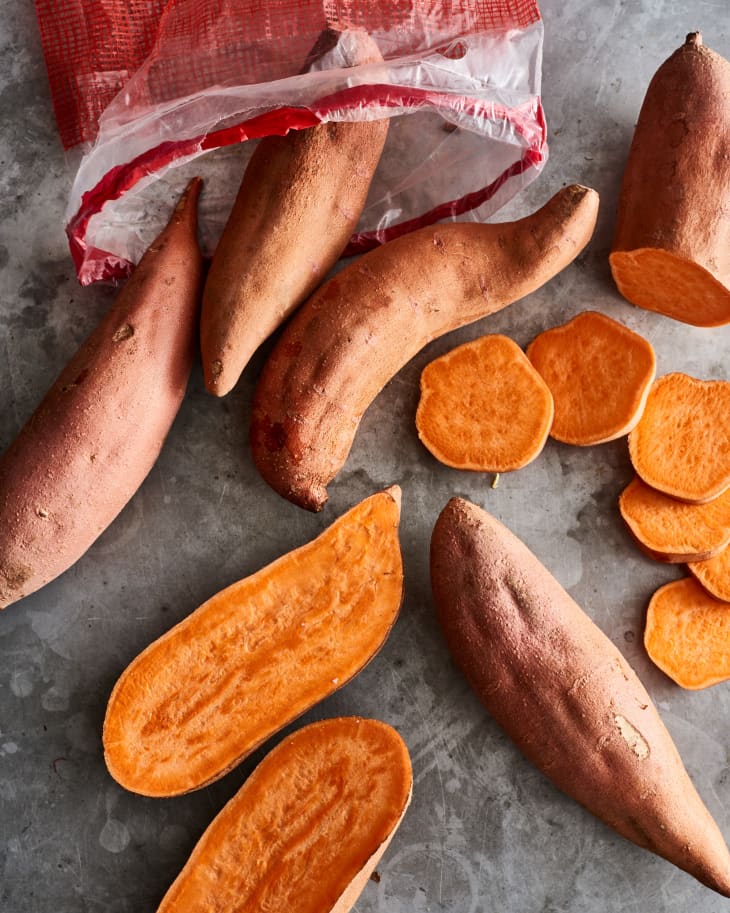How to Store Raw and Cooked Sweet Potatoes So They Really Last
Sweet potatoes are at their peak in the fall and winter, and they are a fixture of many Thanksgiving celebrations, including my own, where a pecan-topped sweet potato soufflé is an absolute must. According to the U.S. Sweet Potato Council, there are hundreds of varieties of sweet potatoes, divided into five main types, noted by the color of their skin and flesh. They’re all delicious. But how to store them to ensure maximum freshness? Read on to find out.
How to Store Raw Sweet Potatoes
Like other root vegetables, such as carrots and white potatoes, sweet potatoes have a relatively long shelf life if stored properly.
Start with fresh sweet potatoes that lack obvious blemishes or soft spots. Store them in a cool, dark place with plenty of ventilation away from a heat source. I keep mine in a breathable bin at the bottom of my pantry, where they’ll last about two weeks. Or, if I’m going to use them in a day or two, I keep them in a bowl on the counter.
Should You Refrigerate Raw Sweet Potatoes?
While refrigeration will technically make your sweet potatoes last longer, that extra time isn’t worth it in the end because refrigerated sweet potatoes can develop an unpleasant bitter taste and hard center, so skip the fridge unless the potatoes have already been cooked.
How to Store Cooked Sweet Potatoes
Once you’ve cooked your sweet potatoes — whether baked whole, roasted cubes, mashed, or any other prep method — you can store them in an airtight container in the fridge for about a week.
To use pre-cooked sweet potatoes, heat them in the microwave in 30-second increments until they’re warmed through. Pre-cooked sweet potatoes are great to keep on hand to add to grain bowls and wraps.
Can You Freeze Sweet Potatoes?
Sweet potatoes can be frozen for up to a year, according to the U.S. Sweet Potato Council, but they must be cooked first. (The one exception is if you want to try the method of cooking a whole sweet potato from frozen described in our Skills Showdown on the best way to bake sweet potatoes.) You can freeze baked, whole sweet potatoes; mashed sweet potatoes; sliced boiled sweet potatoes; and roasted sweet potatoes.
- To freeze baked sweet potatoes, bake them as you normally would, and then let them cool to room temperature before wrapping them in aluminum foil and popping them in a labeled and dated freezer bag.
- To freeze mashed sweet potatoes, bake or boil the sweet potatoes, and then peel and mash. Rather than adding dairy, add a teaspoon of lemon juice to keep the sweet potatoes from turning brown. Freeze in individual servings in a freezer-safe container.
- To freeze sliced sweet potatoes, boil sweet potatoes whole, allow them to cool to room temperature, and then peel and slice them. Add them to a labeled and dated freezer bag, and store for up to a year.
- To freeze roasted sweet potatoes, roast them as you normally would, allow them to cool to room temperature, transfer them to a labeled and dated freezer bag, and store for up to a year.
How to Cook with Sweet Potatoes
Baked, fried, boiled, or mashed, sweet or savory, sweet potatoes are extremely versatile and affordable. Try them in a velvety, rich sweet potato soup or toss them in a big fall salad. You can slice them thinly for sweet potato chips for a snack, roast them with garlic and Parmesan for a scrumptious side dish, and let’s not forget sweet potato pie.
